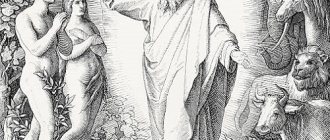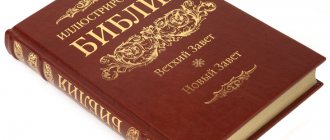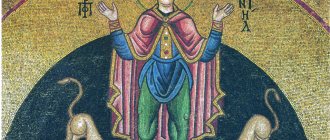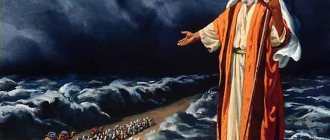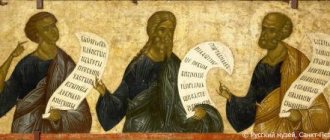He was merciful to the chosen people, however, when the moral decline of the Israelites passed all limits, he retreated and allowed them to be enslaved. So, 722 BC. marked by the fall of the Northern Kingdom of the Jews. The southern one, Judea, lasted a little more than a hundred years, because the kings and people there truly worshiped the One God.
In order for the Jews to repent, the Lord began to send Old Testament prophets, pointing out the lawlessness that was happening. The chosen ones carried repentant sermons and prophecies about the coming into the world of the Savior, who was destined to save the entire human race from the slavery of sin and death.
The more the chosen people needed spiritual help, the louder the Word of God sounded. One by one, prophets appeared, proclaiming His Will and prophesying the imminent coming of the Messiah.
Isaiah
The Holy Fathers spoke about the prophet, who lived on the land of Israel in the 8th century BC, as great and wonderful, insightful and wise.
Isaiah was called by the Lord for prophetic ministry. He appeared sitting on a high throne surrounded by Seraphim. One of the Angels touched Isaiah's lips with a burning coal from the heavenly altar to cleanse him.
Due to numerous requests from readers, we have prepared an “Orthodox Calendar” application for smartphones. Every morning you will receive information about the current day: holidays, fasts, days of remembrance, prayers, parables. Download for free: Orthodox Calendar 2022 (available on Android)
His calling was to save people from the spiritual slavery of pagan worship. Like a burning candle, with its radiance the prophet denounced unpalatable actions. It was he who was entrusted with conveying to the people the news of the destruction of Judea and the captivity of the Jews. Slavery would not have become eternal, and after a set period of time, God's people would have returned home.
Talking about Christ, Isaiah amazed with the accuracy and clarity of events, for which he received the nickname “Old Testament evangelist.” He told people about conception in the womb of an immaculate and chaste Virgin, predicted the suffering of Christ in the name of saving people and the possibility of salvation from separation from God through faith.
His words were heard during times of pagan worship, even in Jerusalem itself. The people did not want to hear Isaiah’s speeches or his sermons and laughed at the prophecies, committing the pious man to martyrdom.
Nevertheless, God fulfilled everything He promised to the Jews who did not accept His will.
The word prophet (“navi”) and its meaning
The Russian “prorok” - from prophek - corresponds to the Hebrew word - “navi” or “nabi”, which can be translated as “herald”, i.e. “the bearer of news” or “called to broadcast.”
In the word “Navi” or “Nabi” there is a semantic root that means in all languages - Arabic, Assyrian, Ethiopian - “Nawat” - speaking (pronouncing). What does it mean to stand out from all those who can speak? Some authors also point to a special root “nabyu”, meaning “to call”, which speaks of a calling to broadcast, namely, one who has heeded the call.
During the translation, the Hebrew “nabi” was replaced by the Greek “prophetos” or prophetis,” meaning to simultaneously speak publicly, speak on someone’s behalf, and predict the future. In the Bible, the Greek term "prothetis" when applied to prophets is used to mean "to speak in the name of", i.e. to carry a message from God, to speak His words, to proclaim His will.
Thus, a prophet is an exponent of the will of God, carrying a message from Him and called by Him to prophecy.
Prophecy is always a gift, not a skill or an arbitrary choice of a person. The call of a prophet or “navi” to serve does not depend on the will of a person; it is God who calls him and conveys to him His will and His sayings. At the same time, the Divine call strengthens the chosen one, God's inspiration forces him to carry the Word, forgetting himself, even to the point of exhaustion, overcoming all sorts of obstacles, not looking at persons and positions, speaking God's truth to his face, not sparing his life in fulfilling God's will.
For some reason, money for fortune-telling, like “gild the pen,” has nothing to do with it at all. Prophecy is a ministry, not a business.
Actually, the people of Israel themselves were called to be “navi” - to bring “light in the revelation of tongues.” But due to the evasion of the majority of the people from this calling, it was necessary to single out special people from among them - prophets who were able to hear the Divine will and convey it to people.
Jeremiah
He was the son of a priest from Anathoth, located near Jerusalem. He received his call to prophetic ministry when he was only 15 years old. It was revealed to the young man that even before his birth he was destined to become the mouth of God. He refused, talking about his youth and inability to speak beautifully, to which God touched the lips of the future prophet and promised to be there.
For 23 years, Jeremiah was engaged in denouncing the Jews for apostasy and idolatry, predicting disasters and wars for the people. He stopped near the entrance to the temple and preached with threats and tears, to which he received only ridicule, curses, threats and even beatings.
Visually demonstrating the coming slavery, Jeremiah hung a wooden and then an iron yoke around his neck. Annoyed by the prophetic speeches of the young man, the Jewish elders ordered him to be sent to a ditch with fetid mud, where he almost died. The God-fearing courtier Ebedmelech managed to help the boy free himself, but he did not stop carrying out his prophetic ministry, for which he ended up in prison.
When the Babylonians came to the Kingdom of Judah, the chosen people believed in the predictions, but it was too late. King Nebuchadnezzar released the young man from prison, allowing him to choose where to live. Jeremiah remained in the ruins of destroyed Jerusalem to mourn the misfortunes of his country and the stupidity of his people.
According to legend, Jeremiah hid the Ark of the Covenant along with the tablets in the caves of the city of Nawaf so that the Jews could not find it. The Jews remaining on the land of Judea decided to flee to the land of Egypt after the murder of the governor of the Babylonian king. The Prophet tried to convince them not to do this, since the punishment they feared would find the Jews there too. Again, not listening to the prophet, the Jews forcibly took him away and settled in the city of Tafnis. Jeremiah lived there for four years, revered by the Egyptians and Jews because, with God's help, he was able to kill crocodiles with prayer. The prophet tried to reveal to the people that the king of Babylon would soon come for them, devastate the land and wipe out the Jewish immigrants from the face of the earth, but the Jews killed him. And the prediction came true...
The Voice of God Among People
Prophets: Aaron, Gideon and Ezekiel.
Prophetic books, or Prophets, occupy a special place among all biblical texts. The Old Testament, according to the Apostle Paul, is a teacher
to Christ and in this sense, the prophecies of the ancient chosen ones of God are an amazing testimony of God’s love for people, His constant calling of the people to salvation:
“Behold, I stand at the door and knock”
(Rev. 3:20).
The Fatherly care of the Almighty for people is revealed in revelations communicated in understandable human language, through people, although not quite ordinary - through prophets, but who spoke to the people in their native dialect - “ having ears to hear , let them hear ” (
Matthew 11:15).
Like a loving and caring Father who reveals to his son his thoughts about life, his experience, his desires, his will, but does not take away his freedom - do as you choose - so the Lord always gives a person a choice:
“Behold, today I have set before you life and good, death and evil.”
(Deut.30:15)…
“Choose life, so that you and your descendants may live, love the Lord your God, listen to His voice and cleave to Him»
(Deut. 30:19-20).
People always heard divine thoughts about the life of mankind and the future Kingdom of Heaven from the lips of the prophets, who were the real voice of God, His lips and “verb burned the hearts of people .
Ezekiel
The son of Vuzius lived in the village of Tel Aviv, not far from Babylonian Nippur, was married, but became a widower. Jews often gathered in his house to talk about God and listen to Ezekiel’s speeches. The Jerusalem priest Ezekiel was brought to Babylon among the first captives.
The book of Ezekiel is compositionally constructed more harmoniously than Isaiah and Jeremiah, and for the most part was written by him. It contains the dates of the most important visions and prophecies, the last one being March 17 (29), 571. The church fathers agree that the prophet soon passed away. It is quite possible that after the death of the teacher, one of the students rebuilt the Book in the traditional manner: a word about the people of God, about the pagans and prophecies.
According to legend, Ezekiel's grave is located near Birs Nimrud. The memory of the prophet is honored by the church on July 21.
Prophecy Perspectives: Past, Present, Future and Eternity
A true prophet is not a prophet of individual human destiny; the whole picture of existence and the path of God’s salvation is revealed to him. He sees all space and time at once, without dividing into past and future; in his words, both the future and the past enter into the present.
“All prophets have the custom of speaking about things that have not yet happened as if they had already happened,” says John Chrysostom (+407).
The main task of a true prophet is to proclaim to people the way of salvation, both to those who live with him and to future generations. The prophet is focused on the future century; he sees all today's events from the point of view of eternity. The main components of Old Testament preaching are messianic expectations and eschatological prophecies about the destinies of the world, the end of times and the eternal Kingdom of Heaven.
In the Orthodox Church, the veneration of the Old Testament prophets as saints dates back to ancient times. In the annual liturgical circle, special days of their remembrance are established. The Church remembers all the Old Testament prophets before the Nativity of Christ on the Sunday of the Forefathers and the Sunday of the Holy Fathers. In addition, the prophets are also honored individually - Samuel, Elijah, Elisha, sixteen prophets-authors of the Old Testament books.
According to the testimony of St. Cyril of Jerusalem (+386), already in ancient times, at the service during the Liturgy in prayer after the celebration of the Eucharist, among other Christian saints, the Old Testament prophets were also named, as in fact now. In the Orthodox tradition, in honor of the Old Testament prophets, the second particle from the “nine-time” prosphora is taken out at the proskomedia - in honor of “The Holy Glorious Prophets: Moses and Aaron, Elijah and Elisha, David and Jesse; the three holy youths, and Daniel the prophet, and all the holy prophets.”
Interesting fact
In the iconostasis of an Orthodox church there are special rows of icons - the ancestral and prophetic ranks.
Fragment of the prophetic row of the iconostasis from the Assumption Cathedral of the Kirillo-Belozersky Monastery.
Daniel
Among the captives brought to King Nebuchadnezzar were young men of noble birth, Daniel, Hananiah, Mishael and Azariah. The king gave orders to teach them wisdom and leave them for education at court. Jewish youths, however, honored the covenants of faith and abandoned luxury and excess, eating only water and vegetables. God rewarded them with wisdom, and gave Daniel the ability to interpret dreams. The young man's insight surpassed the Chaldean sages and was brought closer to the king.
One day Nebuchadnezzar had a dream that impressed him, the contents of which he conveniently forgot the next morning, so he ordered the wise men to reveal the secret of this dream. The Babylonian magicians and astrologers were powerless, but Daniel, to the glory of the Lord and with His help, unraveled the content and meaning of the dream.
After a while, the king wanted to build a huge statue of himself so that honor would be given to her. The youths Azariah, Ananias and Misail refused and were sent into a blazing furnace. The flames should have immediately consumed the young men, but they calmly walked through the fire, praying. Amazed that the young men remained safe, the king decided to turn to God.
During the time of King Belshazzar, the prophet Daniel discovered the meaning of an inscription that mysteriously appeared during a celebration on the palace wall. She spoke of the coming fall of Babylon.
During the reign of the Persian king, the slandered Darius the prophet was thrown to hungry lions, but the predators did not touch him, and he remained unharmed. The delighted and impressed king ordered to worship the One God.
Daniel grieved over the Jewish people, who were justly punished by God for their sins and given into captivity. He repeatedly interceded for him with King Cyrus, who highly valued the prophet. With his righteous life, prayer and piety, Daniel atoned for the sins of his people, for which the fate of the Israelis and the whole world was revealed to him.
Minor prophets
- Obadiah announced the destruction of Edom and the impending judgment of all nations.
- Jonah spoke about the fate of the people of Israel, the upcoming slavery of the Jews and the suffering of Christ.
- Joel predicted the coming of the Day of Judgment, when the Holy Spirit would be poured out on everyone, regardless of gender and age.
- Amos exposed the shortcomings of the social order and human qualities. He identified the chosenness of the Jews with a high degree of responsibility.
- Hosea spoke about Christ, the sins of the Jews, the upcoming captivity and the spread of the true knowledge of God.
- Micah revealed the fall of both Kingdoms, God's punishment, and the future birth of the Savior.
- Nahum predicted the fall of the idolatrous, depraved and witchcraft Nineveh.
- Zephaniah pointed out the need for repentance and permission for the Jewish countries.
- Habakkuk saw the destruction of the temple in Jerusalem, the Babylonian captivity of the Jews, and the return of the latter to their homeland.
- Haggai called on the people to repent and take care not only of their home, but also of the house of the Lord.
- Zechariah announced the coming of the Messiah, trying to convey the meaning of his coming, the need to be worthy of the sacrifice.
- Malachi was assigned the role of a harsh critic: he accused the Jews of insufficient zeal in the affairs of God, the priests of insufficient faith and vices. He talked a lot about the Coming, the Forerunner and God's Judgment.
These are the prophets of the Old Testament...
Who are called prophets in Orthodoxy?
In the Orthodox tradition, prophets are not considered to be soothsayers of the future, not soothsayers and not fortune-tellers.
A true prophet is God’s chosen one, sent to people by God’s will to teach and instruct in the faith and Commandments, impartially point out sin and violation of the Divine Law, expose all lies, correct people’s lives, call for repentance and console, announcing future salvation.
Abraham was named the first prophet in the Bible (Gen. 20:7). God Himself calls Abraham a prophet, establishing with him a special relationship of election and mutual communication. Further in the Bible the prophets or chosen ones of God are called:
- “man of God” (Deut. 33:1) and (1 Sam. 9:6); “For prophecy was never made by the will of man, but holy men of God spoke as they were moved by the Holy Spirit” (2 Pet. 1:21);
- or “seer” - this is how Samuel is called (2 Sam. 24:11) and other prophets (Am. 7:12);
- or “seer” (Amos 7:12), i.e. the one to whom God's judgments (fates) are open;
- or “guardian of the house of God” (Ezek. 3:17) - because the prophet was called to guard and protect Israel from spiritual enemies;
- and also “Angel of the Lord” - i.e. messenger of the will of God (2 Samuel 14:17), (Dan.13:55), (Judges 2:1–4).
These names indicate that the prophet is the representative of God on earth and his purpose is to be a voice that awakens the conscience of the people. Many chosen ones had these lips of Truth, and in a broad sense, all the patriarchs can be considered prophets, starting with Adam - and Enoch, and Noah, and Abraham, and Isaac with Jacob, and Moses with Aaron, and beyond. After all, they had experience in the knowledge of God and were ancestors - forefathers, and then passed on this experience to their descendants, becoming conductors between people and God.
What is prophetic ministry?
Prophetic ministry is about establishing a connection between God and man, conveying Divine messages to people.
Man could not have realized this two-way connection on his own, without God’s will; therefore, the concept of chosenness comes to the fore in prophetic ministry.
Nothing - neither origin, nor age, nor gender, nor wealth and social status, nor education, nor the ability to speak beautifully, nothing gave an advantage in the performance of prophetic ministry, but only Divine election.
Both noble, high-born and simple, even poorly educated people were prophets. For example, Isaiah and Daniel came from a royal family, Jeremiah and Ezekiel were priests by birth, and Amos was from simple shepherds. David was a talented poet, an excellent musician and performer; the entire royal court enjoyed his singing, but Moses’ speech was completely incomprehensible to people, because he was tongue-tied and stuttered. But this did not stop him from becoming the greatest prophet, because the Lord chose him, and his words were translated to people by brother Aaron.
Before his calling, the prophet was an ordinary person; the Word of the Lord was revealed to him once, and his life changed once and for all. This is what the Bible says, for example, about the call of Samuel - one morning he was awakened by a voice calling him by name (1 Samuel 3:7).
People did not always happily accept the Divine challenge. After all, it is not a simple and even life-threatening thing to tell people the truth about them. Prophet Jonah, sent to Nineveh, the capital of a hostile state, tried to escape from God's call. And he almost died in the abyss, and spent three days in the whale’s belly, but was still saved, because he had to fulfill God’s command to call the pagans to repentance - a matter, in fact, more fantastic than being inside a whale.
Some other prophets also hesitated and sometimes showed human weakness. God repeatedly called and exhorted Moses (Exodus 3:11–4:17) and Jeremiah (Jeremiah 1:6–9), using miracles to convince (Exodus 4:2–9,17). None of them themselves sought to take the path of prophetic service. Through human weakness, Jonah fled, Ezekiel avoided, Jeremiah denied. The Lord did not force them and did not break the will of man, but advised, convinced, and sometimes threatened, but did not darken their minds, but enlightened them, expecting human consent to fulfill the will of God.
It would be impossible for a simple person to fulfill God’s command if God Himself did not strengthen him with His power:
“And behold, I have made thee this day a fortified city, and a pillar of iron, and a wall of brass, in all this land, against the kings of Judah, against the princes thereof, against the priests thereof, and against the people of the land. They will fight against you, but they will not prevail against you; For I am with you, says the Lord, to deliver you. (Jer.1:18-19).”
Prophecy is carried out through the Divine call of a person to prophetic service, through the union of the human will with God's will, through the strengthening of human powers by the Divine Spirit and through the perception of Divine revelations through dreams, through words, through visions.
The Lord himself pointed out three ways for prophets to receive revelations - in the form of pictures, or by ear, sometimes in dreams:
“If there is a prophet of the Lord among you, then I reveal myself to him in a vision, I speak to him in a dream; but not as with My servant Moses... I speak to him mouth to mouth, and openly, and not in fortune-telling, and he sees the image of the Lord...” (Num. 12:6-8).
Here it is clear that a true prophet receives revelation not in a trance, not in a narcotic dope, but in a clear mind - he talks mouth to mouth with God.
“In general, prophecy is such an admiration of the mind by which prophetic grace, suddenly embracing the prophets and separating them from everything human, made them capable of becoming instruments for speaking prophetic words,” says Blessed Theodoret (+458).
The prophetic ministry had religious, moral and political goals:
Through prophetic preaching, faith in the One God was maintained among the people. The prophets did not let people forget about the future coming of the Messiah - the Savior. They took care that external ritual and the implementation of religious actions did not replace the sincere heartfelt faith of a person, and protected the Jewish people from paganism.
The prophets themselves, as individuals, were examples of sincere faith, love for God and life according to His Commandments. They instructed people in God's Truth, exposing sin, lies and hypocrisy. Prophetic ministry did not allow the moral life of the people to become clouded, purifying it and softening the rudeness of morals.
The prophets took a direct part not only in the religious and cultic life, but also in the socio-political life of God’s chosen people, anointing kings to reign, determining the nature of relations with neighboring states and tribes, and calling to always act according to the command of God. Often they went with their preaching even to their pagan neighbors, denouncing sin and unbelief, and stopping hostility towards the people of God.
Recommendations
- Augustine (1866). Civ.
18.29: Corpus scriptorum ecclesiasticorum latinorum (Vienna, 1866–) . 40.2.306. - ^ a b
Zvi 2004, pp. 1139–42 - Reddit 2003, paragraph 1.
- Coggins and Khan 2011, para. 4.
- Reddit 2003, pp. 1–3, 9.
- Floyd 2000, paragraph 9.
- Dell 1996C. 86–89.
- Coogan 2009.
- Ben Zvi 2004C. 1193–94. sfn error: no target: CITEREFBen_Zvi2004 (help)
And she
The name means "dove". An Israelite from Get-a-Kovera in the Northern Kingdom, a contemporary of the prophet Amos. Blessed Jerome cites the legend that Jonah is the same son of the widow from Zarephath of Sidon, whom the prophet Elijah resurrected. Jonah is also considered a disciple of the prophet Elisha. Preached to the Northern Kingdom under Jeroboam II. He was also sent to the pagans in Nineveh, but he resisted this command of God and tried to sail on a ship to the other side - the Spanish city of Tarshish. The Lord sends a storm to pacify it, the shipmen throw the “culprit” of the storm into the sea, where he is swallowed by a certain sea animal and three days later spits him out on the shore just opposite Nineveh.
Unlike other prophets, Jonah prophesies about Christ with his very life, described in his fascinating book. His prophecy and its fulfillment are indicated by Christ Himself :
“An evil and adulterous generation seeks a sign; and no sign will be given to him except the sign of the prophet Jonah; for as Jonah was in the belly of the whale three days and three nights, so the Son of Man will be in the heart of the earth three days and three nights” (Matthew 12:39-41).
After his death, Jonah was buried in Nineveh, whose inhabitants repented after his preaching. There Jonah lived until the end of his days.
Prophecies about Christ from the prophet Joel:
Joel 2:28-32 “And it shall come to pass after this that I will pour out My Spirit on all flesh, and your sons and your daughters shall prophesy... And also on male and female servants in those days I will pour out My Spirit. And I will show signs in heaven and on earth: blood and fire and pillars of smoke. The sun will turn into darkness and the moon into blood before the great and terrible day of the Lord comes. And it will be: everyone who calls on the name of the Lord will be saved” - a prophecy about the outpouring of the gifts of the Holy Spirit on Christians and about the coming of the Day of the Last Judgment of God.
Habakkuk
The name means "beloved." He is mentioned in the non-canonical part of the book of the prophet Daniel. Habakkuk preached at the same time as this prophet. This is already the second prophet, whom some interpreters identify with the resurrected son of the Sarepta widow or Shunammite (her son was resurrected by the prophet Elisha). Habakkuk began his preaching in the Southern Kingdom even before the capture of Jerusalem by the Babylonians, under the wicked king Manasseh.
The opening words of the 2nd chapter of his book “I stood on my watch” became the basis for the irmos of the 4th song of the Easter canon: “On the Divine guard, may the God-speaking Habakkuk stand with us and show the luminous Angel, clearly saying: this day is salvation for the world, for Christ is risen, for the Almighty "
The words of this book are also found in other liturgical irmos: “Lord, I heard Thy hearing and feared,” “Thou camest from the shadowy mountain thicket,” “Thy virtue covered the heavens, O Christ” - from chapter 3 of the book. This speaks of the poetry and prophetic significance of the book.
In the stichera to the prophet Habakkuk himself, we hear: “Standing on the Divine guard, honorable Habakkuk heard the mystery of Your Coming to us, O Christ, ineffable, and Your preaching prophesies most clearly, seeing the wise apostles like horses, the tongue of the multi-tribal disturbing the sea,” and in the troparion to him: “Having preached the Lord of Glory, and prophesied the coming from the Holy Virgin, which was manifested, and seeing what was shown, blessed Habakkuk rejoiced.”
Zechariah
The name means "God remembered." Probably came from a priestly family. Companion of the prophet Haggai.
Prophecies about Christ from the prophet Zechariah:
Zakhar. 3 “And he showed me Jesus the great priest standing before the Angel of the Lord, and Satan standing at his right hand to resist him” - a revelation of the name of the Coming Savior, Who will take away the sins of the world.
Zakhar. 9:9-10 “Rejoice for joy, daughter of Zion, rejoice, daughter of Jerusalem: behold, your King is coming to you, righteous and saving, meek, sitting on a donkey and on the colt of a donkey... And He will proclaim peace to the nations, and dominion It will be from sea to sea and from the river to the ends of the earth” - a prophecy about the entry of the Lord into Jerusalem.
Zakhar. 11:12-13 “And I will say to them, If it pleases you, then give Me My wages; if not, don’t give it; and they will weigh out thirty pieces of silver as payment to Me. And the Lord said to me: throw them into the church storehouse - the high price at which they valued Me! And I took thirty pieces of silver and threw them into the house of the Lord for the potter” - about the sale of the Lord for 30 pieces of silver.
Zakhar. 12:9-10 “And it shall come to pass in that day that I will destroy all the nations that attack Jerusalem. And I will pour out the spirit of grace and compunction on the house of David and on the inhabitants of Jerusalem, and they will look at Him, Whom they have pierced, and they will weep for Him as they weep for their only begotten son, and grieve as they grieve for their firstborn” - for the piercing of the Lord’s side.
Zakhar. 13:7 “O sword! rise up against My shepherd and against My neighbor, says the Lord of hosts: smite the shepherd, and the sheep will be scattered!” - about the defeat of the Shepherd and the scattering of the sheep.
Baruch
The name means "blessed". Baruch was a scribe and companion of the prophet Jeremiah. Little is known about his life. A seal of “Berechiah the son of Neriah, the scribe” was found in Jerusalem, which is believed to have belonged to the prophet Baruch. The brother of the prophet Seraiah was in charge of collecting taxes under King Zedekiah. The prophet Baruch wrote down the words of Jeremiah and was thrown into prison with him, and then followed him to Egypt, where he began to preach on his own. The book of the prophet Baruch is classified as deuterocanonical, not included in the canon of Ezra and Nehemiah. Its original came to us not in Hebrew, but in Ancient Greek.
Christian commemoration
In the Roman Catholic Church, the twelve minor prophets are read in the Tridentine Breviary during the fourth and fifth weeks of November, which are the last two weeks of the liturgical year.
In the first year of the modern Lectionary, Haggai, Zechariah, Jonah, Malachi, and Joel are read in weeks 25–27 of Ordinary Time. In 2nd grade, Amos, Hosea, and Micah is read during weeks 14–16 of regular time. In Year 1 of the Bureau's two-year cycle of readings in the Liturgy of the Hours, Micah 4 and 7 are read in the third week of Advent; Amos, Hosea, Micah, Zephaniah, Nahum, and Habakkuk are read in weeks 22–29 of ordinary time. In Year 2, Haggai and Zechariah 1–8 are read in weeks 11–12 of Ordinary Time; Obadiah, Joel, Malachi, Jonah, and Zechariah 9–14 are read in the 18th week.
They are collectively celebrated in the Calendar of Saints of the Armenian Apostolic Church on July 31.
